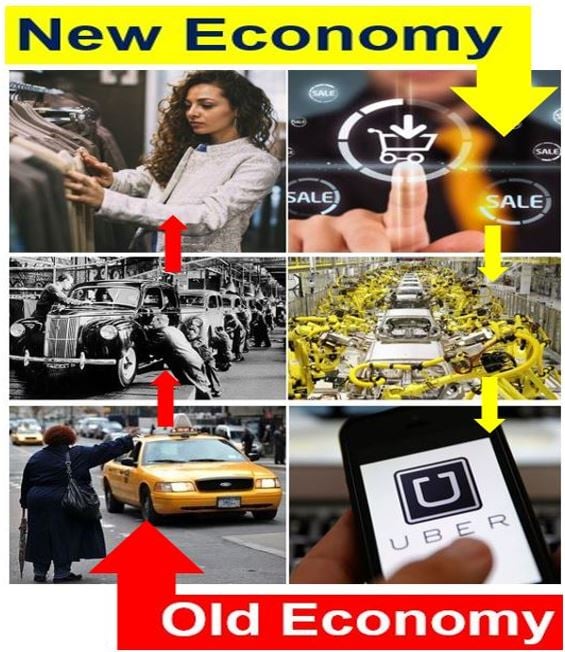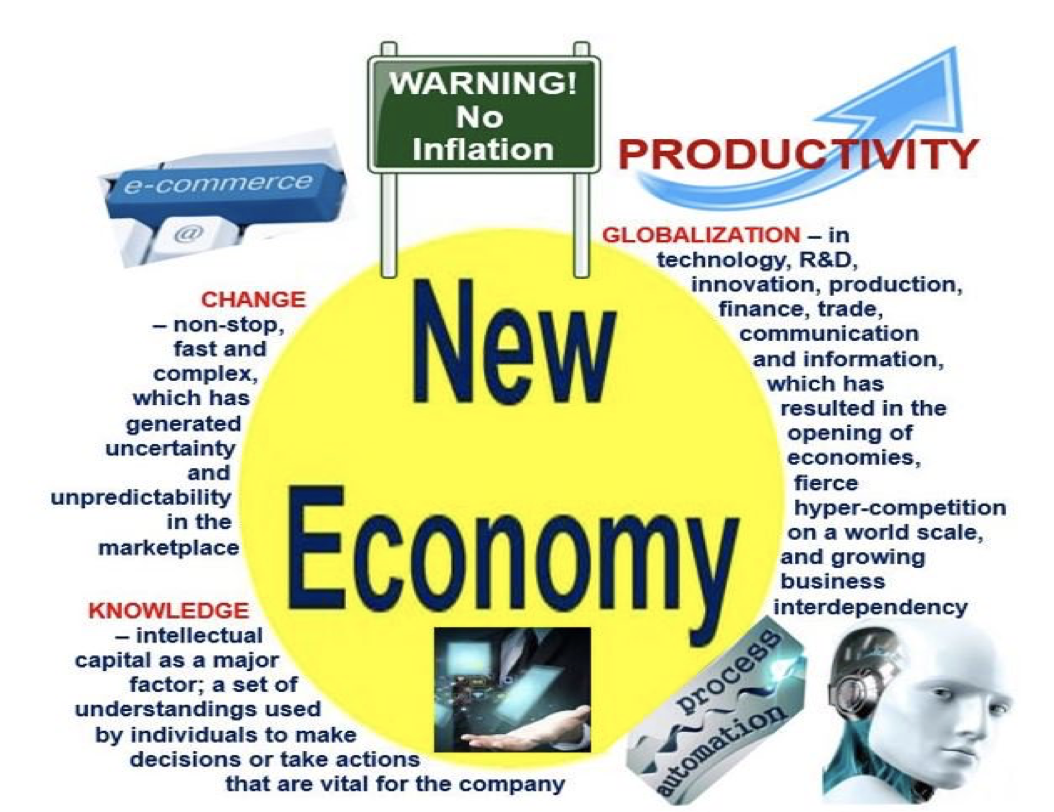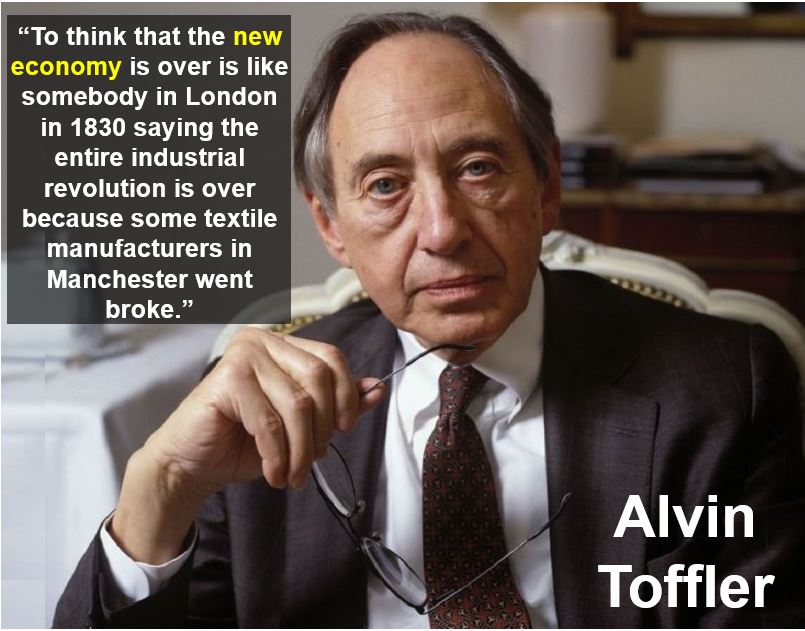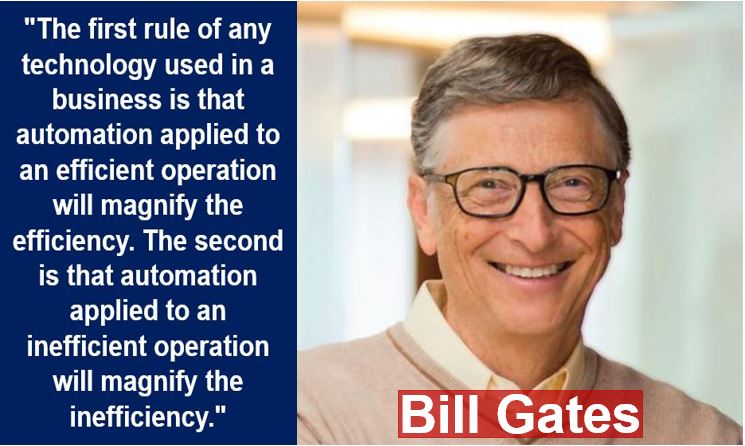The New Economy is a term many economists started to use in the last decade of the 20th century. They argued that information technology, the Internet, ultra-high-tech companies and globalization had created a completely new type of economy, with considerably greater productivity and growth rates than the old one that it replaced.
Put simply, it is a buzzword that describes the new, high-growth industries with state-of-the art technologies that are the driving force of GDP (gross domestic product) growth.
The new economy is the transition from a manufacturing-based to a service-based economy.
The new economy was born in the United States in the 1990s, and within a few years in the other advanced nations too. Within a decade, many of the emerging economies also underwent a similar economic metamorphosis.
Hi-tech and the Internet have not only changed how we rest, work and play, say some economist, they have also changed the fundamental laws of economics. Automation has dramatically changed the employment prospects of the blue-collar worker, the way we shop is vastly different today. Hailing a taxi by raising an arm is something children under 10 will probably never have to do as adults. A larger number of economists agree that some changes have occurred, but insist that what makes an economy tick remains the same.

The Internet and the new economy
According to a number of economists, the emergence and rise of the Internet as a business medium – ecommerce (electronic commerce) – had dramatically changed economic rules.
In this novel economy, they claimed, former business valuation techniques were invalidated by the resulting rapidly-changing business environment.
 The Economist says that the term fell into disuse after the dotcom stock market bubble burst in 2000. However, productivity continued to rise dramatically, thanks partly to new technology, especially in the USA.
The Economist says that the term fell into disuse after the dotcom stock market bubble burst in 2000. However, productivity continued to rise dramatically, thanks partly to new technology, especially in the USA.
The new economy – unusual features
Some economists went even further, claiming that inflation in the new economy had vanished, the business cycle no longer existed, and the traditional rules of economics no longer applied.
A larger number of economists disagreed, pointing out that similar claims and predictions had often been made in the past when rapid advances in technology were underway. In every case, they emphasized, the fundamental economic rules remained unchanged.
Believers in the new economy got caught up in the hysteria surrounding the tech bubble at the turn of the century and the first few years of this century.
While totally ignoring macroeconomic factors, financial institutions and investors were caught in a bidding frenzy that dramatically pushed up stock prices.
Today’s hi-tech multinational giants
The tech bubble eventually popped, billions of dollars were lost, and hundreds of companies crashed. However, the ones that survived are today mega-innovative multinational Goliaths with cutting edge technology.
Businesses in today’s so called new economy are heavily involved in online activities and biotech industries. Their massive clout has created ripple effects of new technologies that are finding their way into virtually every industry.
 Alvin Toffler (1928-2016) was an American futurist and writer, famous for his works discussing modern technologies. He was an associate editor for Fortune Magazine. (Image: thefamouspeople.com)
Alvin Toffler (1928-2016) was an American futurist and writer, famous for his works discussing modern technologies. He was an associate editor for Fortune Magazine. (Image: thefamouspeople.com)
Of the top five companies in the world according to market value today, three are hi-tech – Apple, Google and Microsoft. The top five in 1980 were all oil and car companies; not one hi-tech business.
The first mention of the term dates further back than the 1990s. In 1983, a cover article in Time Magazine – ‘The New Economy’ – described the transition from heavy industry to an economy based on new technology. Newsweek and other well-known publications were regularly using the term in many of their articles in the second half of the 1990s.
 Bill Gates (born: 1955) is an American multi-billionaire business magnate, investor, entrepreneur, author and philanthropist. He co-founded Microsoft with Paul Allen in 1975. The company became the world’s largest PC software business. Since 1995, he has been listed by Forbes as the wealthiest person in the world most years, and every year since 2014. (Image: twitter.com/BillGates)
Bill Gates (born: 1955) is an American multi-billionaire business magnate, investor, entrepreneur, author and philanthropist. He co-founded Microsoft with Paul Allen in 1975. The company became the world’s largest PC software business. Since 1995, he has been listed by Forbes as the wealthiest person in the world most years, and every year since 2014. (Image: twitter.com/BillGates)
New economy – online companies
Over the last few years, many 100% online companies have grown into large multinational corporations. Amazon.com, based in Seattle, Washington, USA, an electronic commerce and cloud computing giant, is today the biggest Internet-based retailer in the world. It reported $538.046 billion in net sales in fiscal 2022.
Facebook, a US for-profit corporation based in Menlo Park, California, is an online social media and social networking service giant. It became the fastest company in the Standard & Poor’s 500 Index to reach a market capitalization of $250 billion on July 13th, 2015. It now has over three billion monthly active users (as of the second quarter of 2023).
California-based Netflix, a multinational entertainment company that specializes in and provides streaming media and video on demand, reported 238.39 million paid subscribers worldwide as of the second quarter of 2023.
Other businesses that have become huge internationally are, Uber, eBay, Expedia, Tencent, Alibaba, Baidu, Priceline Group, Yahoo, Salesforce, Twitter, Trip Advisor, and ASOS.
Understanding the ‘New Economy’ Phrase
The phrase ‘New Economy’ is a combination of the words ‘new’ and ‘economy’ to describe the shift towards high-tech, computer-based industries that have emerged in recent decades.
We use many phrases with the word ‘economy’ to discuss various economic concepts. Here are nine such terms related to the ‘New Economy’ theme:
-
Digital Economy
Centers on digital computing technologies.
-
Internet Economy
Driven by Internet connectivity and commerce.
-
Knowledge Economy
Based on intellectual capabilities rather than physical inputs or natural resources.
-
Innovation Economy
Focused on producing and implementing new ideas and innovations.
-
Tech Economy
Economy centered on technological industries.
-
Information Economy
Where information is both the currency and the product.
-
Network Economy
Emphasizes the value of networks, including the internet, for economic growth.
-
Post-Industrial Economy
Transition from manufacturing-based industries to service-oriented information-centric businesses.
-
Global Economy
Highlights the interconnectedness and interdependence of national economies across the world, often associated with technological advances.
Other Languages
Here is the translation of ‘New Economy’ in some other languages:
- English: New Economy
- Mandarin Chinese: 新经济 (Xīn jīngjì)
- Jin Chinese: 新经济 (Xīn jīngjì)
- Cantonese Chinese: 新經濟 (San1 ging1 zai3)
- Hindi: नई अर्थव्यवस्था (Nai arthavyavastha)
- Spanish: Nueva Economía
- French: Nouvelle Économie
- Arabic: الاقتصاد الجديد (Al-iqtisad al-jadid)
- Bengali: নতুন অর্থনীতি (Notun arthaniti)
- Russian: Новая экономика (Novaya ekonomika)
- Portuguese: Nova Economia
- Indonesian: Ekonomi Baru
- Urdu: نئی معیشت (Nai Maishat)
- German: Neue Ökonomie
- Japanese: 新経済 (Shin keizai)
- Swahili: Uchumi Mpya
- Marathi: नवीन अर्थव्यवस्था (Navin arthavyavastha)
- Telugu: క్రొత్త ఆర్థిక వ్యవస్థ (Krottha ārthika vyavastha)
- Turkish: Yeni Ekonomi
- Korean: 신경제 (Sin gyeongje)
- Tamil: புதிய பொருளாதாரம் (Puthiya porulādhāram)
- Vietnamese: Kinh tế Mới
- Italian: Nuova Economia
- Egyptian Arabic: الاقتصاد الجديد (Al-iqtisad al-jadid)
- Gujarati: નવી અર્થવ્યવસ્થા (Navi arthvyavastha)
- Iranian Persian: اقتصاد جدید (Eghtesad-e jadid)
- Bhojpuri: नया अर्थव्यवस्था (Naya arthvyavastha)
- Southern Min: 新經濟 (Sin keng-chè)
- Hakka: 新經濟 (Sin kîn-chè)
- Hausa: Tattalin Arzikin Zamani
- Kannada: ಹೊಸ ಆರ್ಥಿಕತೆ (Hosa ārthikate)
Video – What is the New Economy?
This video, from our sister channel in YouTube – Marketing Business Network – explains what the term ‘New Economy’ means using easy-to-understand words and examples.
